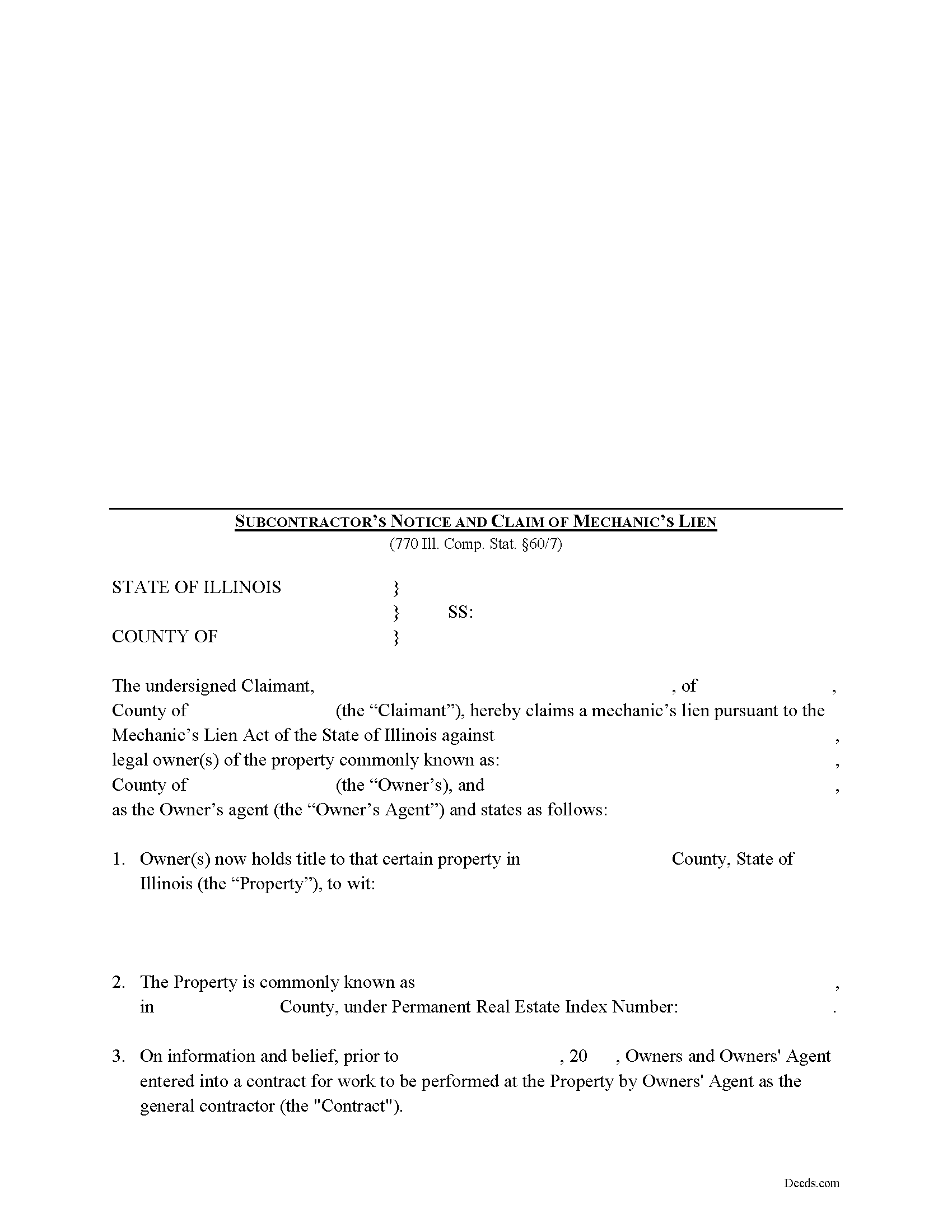Illinois Mechanics Lien Subcontractor
County Specific Legal Forms Validated as Recently as October 21, 2025

About the Illinois Mechanics Lien Subcontractor

How to Use This Form
- Select your county from the list on the left
- Download the county-specific form
- Fill in the required information
- Have the document notarized if required
- Record with your county recorder's office
What Others Like You Are Saying
“it was a smooth superb timely experience”
— eric m.“Easy to process orders.”
— JoAnn S.“Quick and simple process! I wish I would have used them sooner!”
— Gloria L.“I was so Happy to find a website that had deeds for property, reasonable price, helpful directions f…”
— NANETTE G.“Useful and quick.”
— James R.
Lien Claims by Subcontractor in Illinois
Mechanic's liens are available in Illinois pursuant to the Mechanic's Lien Act compiled under 770 ILCS 60. Liens are generally available for contractors, subcontractors, material or equipment suppliers, architects, and other design professionals. Subcontractors claiming a mechanic's lien should use the specialized form that references the contract between the property owner and the contractor (referred to as his or her agent in the lien claim document).
A lien is a type of property interest, like a mortgage. There are many types of liens such as tax liens, attorneys' liens, and judgment liens. A lien operates by allowing the lienor to make a claim against the property if it is later sold. Therefore, for a sale to occur, the property owner is required to disclose the existence of the lien to any potential purchaser and the sales proceeds must be used to pay off that lien. If the lien exceeds the value of the property this creates something known as a "deficiency," which must be recovered through a lawsuit. The lienor can also force a sale through foreclosure. Illinois only authorizes mechanic's liens on private projects and not those associated with public (government) entities.
When you provide labor or materials as a subcontractor to a general contractor and the general contractor never pays his or her invoice, filing a mechanic's lien is usually the next step in recovering the amount due. Subcontractors must also individually file 60-day (owner-occupied residential projects only) and 90-day notices to access their lien rights under State law. It is also helpful to attach these previous filed documents to the lien claim as exhibits to further support your case.
Mechanic's liens demand strict deadlines and missing the filing date by even one day can cost you your right to a lien. In Illinois, the time to file a lien arises within four (4) months from the last date of furnishing labor or delivered materials to the jobsite pursuant to the contract between the owner and his or her agent (contractor). The four-month period applies to your right against all third parties and subsequent owners. You have two (2) years to file suit against the original owner to foreclose on a mechanic's lien. 770 ILCS 60/9.
The claim for lien must state the parties to the contract and its terms, identify the general contractor and property owner, state a legal description of the owner's property, and state the total amount due and unpaid as of the date the notice is recorded. The lien amount includes the invoice amount owed minus all credits and offsets. A lienor may not include extras such as attorney's fees (unless a suit is filed to enforce the lien) or lost profits but may charge interest measured by the legal rate in Illinois. 770 ILCS 60/1(a).
Before recording the lien, sign it in the presence of a notary public who then notarizes it with his or her seal. The lien should be recorded at the recording office for the county where the property is situated. For residential projects, you must serve the owner with a copy of the recorded lien within ten (10) days' time.
The deadlines for filing a lien are set in stone, and failure to file on time will cost you your right to a lien. Additionally, putting in improper amounts or exaggerating the claim will invalidate the lien. If you lose your lien rights, the only remedy is to sue the property owner under contract law. As lawsuits are expensive, time-consuming, and stressful, this will become a much more challenging endeavor as opposed to enforcing a lien.
Each case is unique. Contact an attorney with specific questions regarding filing a subcontractor's claim or any other issues related to mechanic's liens in Illinois
Important: County-Specific Forms
Our mechanics lien subcontractor forms are specifically formatted for each county in Illinois.
After selecting your county, you'll receive forms that meet all local recording requirements, ensuring your documents will be accepted without delays or rejection fees.
How to Use This Form
- Select your county from the list above
- Download the county-specific form
- Fill in the required information
- Have the document notarized if required
- Record with your county recorder's office
What Others Like You Are Saying
“it was a smooth superb timely experience”
— eric m.“Easy to process orders.”
— JoAnn S.“Quick and simple process! I wish I would have used them sooner!”
— Gloria L.“I was so Happy to find a website that had deeds for property, reasonable price, helpful directions f…”
— NANETTE G.“Useful and quick.”
— James R.Common Uses for Mechanics Lien Subcontractor
- Transfer property between family members
- Add or remove names from property titles
- Transfer property into or out of trusts
- Correct errors in previously recorded deeds
- Gift property to others